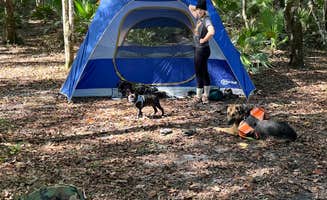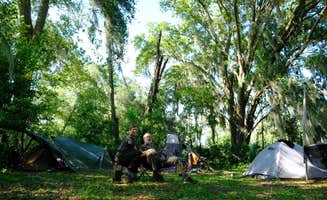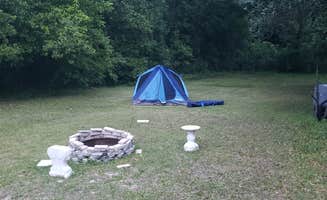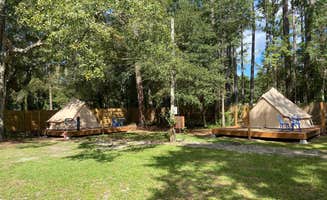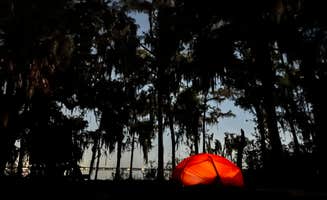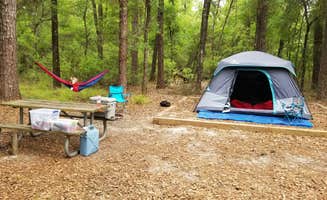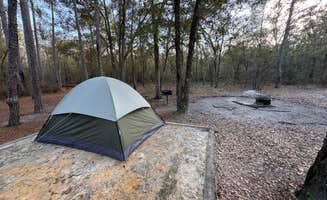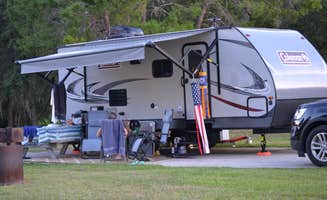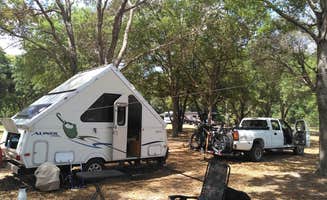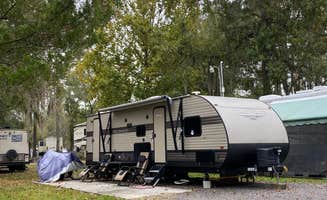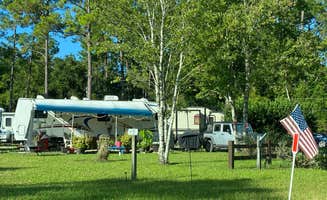Fleming Island camping options extend beyond the immediate area into several conservation lands and state parks within a 30-60 minute drive. The region sits at the confluence of Black Creek and the St. Johns River, creating diverse camping environments from riverside sites to forested settings. Winter temperatures average 45-65°F, making December through February ideal for campers seeking cooler conditions without the summer humidity.
What to do
Hiking trails and boardwalks: Camp Chowenwaw Park offers accessible nature paths for all skill levels. "There is a fun trail to hike with a wooden bridge over the swamp. The camp has access to black creek and is fun for kayaking," notes Sean B.
Mountain biking: Kathryn Abbey Hanna Park features extensive trail networks for cyclists. "Miles of biking/hiking trails at this park. Great quick getaway for those living in the Jacksonville metro area," according to Chad P.
Fishing access: Multiple water bodies provide fishing opportunities around Fleming Island. "Great cheap camping and free spot to hike and drop your kayak," mentions Jenn B. about Camp Chowenwaw Park.
Swimming options: Many campgrounds maintain pools for campers when natural swimming isn't practical. A visitor to Camp Chowenwaw noted, "The pool is a nice feature, you just be over age 18 and have your license with you to swim, which is weird."
What campers like
Privacy between sites: Many camping sites near Fleming Island offer natural separation. At North Beach Camp Resort, "Most RV sites are extremely private with plenty of vegetation between them. Our site (118) is a very deep, wide back-in," says Sarah.
Diverse wildlife viewing: The area's conservation lands support abundant animal sightings. "On our way to our campsite we were able to spot many animals including: deer, otter, turkey, and wild pigs," reports a visitor to Bayard Conservation Area.
Evening atmosphere: Nighttime at these campgrounds offers natural soundscapes. At Bayard Conservation Area, "the frogs serenaded us every night loudly, so that was a cool experience." This contrasts with more developed camping areas closer to Fleming Island.
Unique accommodations: Beyond standard tent and RV sites, distinctive lodging options exist. "The treehouses are very cool and sleep four people... The park has a swimming pool and other places to camp besides the treehouses," shares Sean B. about Camp Chowenwaw Park.
What you should know
Access challenges: Some primitive sites require significant hiking. At Black Creek Ravine, "My family hiked about 2.4 mi in to this campsite and stayed one night. We liked that you have to hike in, there is no car access," explains Nate D.
Facilities condition varies: Bathroom amenities differ substantially between campgrounds. "The bathhouse was clean and well kept," says Gina E. about Mike Roess Gold Head Branch State Park, contrasting with less maintained facilities elsewhere.
Seasonal insect activity: Mosquitoes remain a consistent challenge, particularly during warmer months. "There are lots of mosquitoes, so beware of that and bring bug spray," warns a camper at Camp Chowenwaw Park.
Site specifics matter: Even within a single campground, site quality can vary dramatically. "Having seen the mistake of choosing site #6, was able to switch to #243 with no neighbors, but a short walk to the bathrooms," shares a camper at Kathryn Abbey Hanna Park.
Tips for camping with families
Look for dedicated activities: Several campgrounds offer family-oriented amenities. "We stayed here for a night and loved it. There were short trails, a kayak/canoe launch, a pool, dock, fishing, and clean amenities," writes a visitor to Camp Chowenwaw.
Consider cabin options: For families not ready for tent camping, cabins provide a transition. "We have stayed here many times. In cabins or in tent. We like to hike which there is plenty of. Canoe which they rent. Firewood is available," mentions Jenn B. about Mike Roess Gold Head Branch State Park.
Plan for swimming regulations: Pool access often comes with specific rules. "The children had to do swim tests and wear a necklace denoting which portion of the pool they could be in," notes a visitor about Camp Chowenwaw Park's strict pool management.
Prepare for wildlife encounters: Animal sightings enhance the family experience when expected. At Jennings State Forest, "We went in March and it got pretty chilly at night, but the fire pit helped us stay warm... The sites are all on one loop, but there are trees and bushes separating each one for some privacy."
Tips from RVers
Site selection considerations: RV sites vary widely in accessibility. "Whenever you do find your site, it might be really tight. Mine was on a curve from the road," warns an RVer at Kathryn Abbey Hanna Park.
Military facility options: Service members have additional camping resources. At Jacksonville RV Park on Naval Air Station, "People keep to themselves at the campground as most are seasonal. As for the amenities; free washer/dryer, bathhouse access, access to military hospital, marina, golf course, commissary, and exchange."
Hookup quality assessment: Water and electrical connections require inspection. "The sewer line was 4 inches off the ground, and at a 90-degree angle, gravity doesn't work well with this setup," reports an RVer at Kathryn Abbey Hanna Park.
Weather preparedness: Northeast Florida climate affects camping comfort throughout the year. "It was very enjoyable but HOT in July with no electric in the Treehouses. We had no issues with mosquitoes or yellow flies," shares a visitor at Camp Chowenwaw Park.


